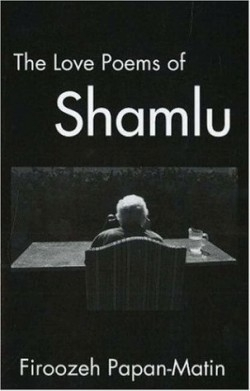
The Love Poems of Ahmad Shamlu
The name of Ahmad Shamlu (1925—2000), widely recognized as one of the major Iranian poets of the twentieth century, will be new to most American readers. A prolific writer and translator who helped to introduce many world authors to Iran, Shamlu was often at odds with the several governments that rose and fell in his native country during his lifetime, remaining a strong and independent voice for artistic and political freedom. This collection of Shamlu’s love poems, with extensive introductory material (the editor/translator is a professor of Persian at the University of Washington) may help to introduce Shamlu’s impassioned poems to a wider circle of readers.
Among the poet’s main influences were his Iranian predecessor Nima Yushij and others better known in the West, including the Russian Vladimir Mayakovsky and Louis Aragon of France. Like these others, Shamlu writes extravagant love poems, romantic in their sensibility but leaning toward the surreal in their imagery. His major early poem “Roxana” places the poet-speaker in a beach house, filled with yearning for his vanished beloved, whose voice informs him of his inadequacy: “If you were capable of coming, I would have taken you with me. / You would have become a cloud and upon our meeting fire would have / sparked from our hearts and brightened up the sea and the sky.”
Moments in these poems will remind readers of other poets Shamlu translated—Octavio Paz, Federico Garcia Lorca. At times the language has an almost Whitmanian scope, even while the focus on the lost beloved in some of the early poems has a whiff of Edgar Allan Poe. The later poems, however, are leaner and less florid, especially those written after Shamlu’s long-lasting 1962 marriage to his third wife, Aida. The last of four “Rhapsodies for Aida” opens especially beautifully: “Your kisses / are chattering sparrows of the orchard / Your breasts / the hive of all the hillsides / your body / an eternal mystery / granted to me / in an immense privacy.”
Papan-Matin’s translations are readable if not especially lyrical; his nearly fifty pages of introductory biographic and critical material could also be crisper and more direct, though they provide much useful information. Given that little of Shamlu’s work is readily available in English, one can only hope that this volume of love poems will be followed by collections of his broader work that will help Americans learn more about a rich culture often reduced to hysterical stereotypes by politicians and cable news commentators.
Reviewed by
Jeff Gundy
Disclosure: This article is not an endorsement, but a review. The publisher of this book provided free copies of the book to have their book reviewed by a professional reviewer. No fee was paid by the publisher for this review. Foreword Reviews only recommends books that we love. Foreword Magazine, Inc. is disclosing this in accordance with the Federal Trade Commission’s 16 CFR, Part 255.
